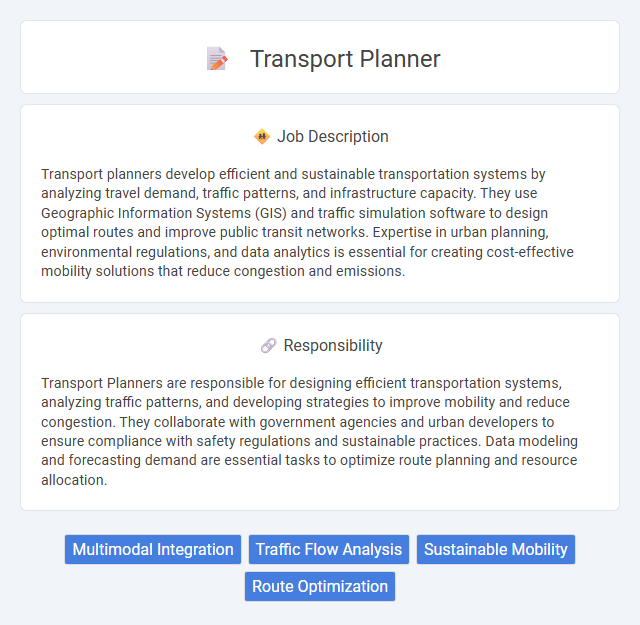
Transport planners develop efficient and sustainable transportation systems by analyzing travel demand, traffic patterns, and infrastructure capacity. They use Geographic Information Systems (GIS) and traffic simulation software to design optimal routes and improve public transit networks. Expertise in urban planning, environmental regulations, and data analytics is essential for creating cost-effective mobility solutions that reduce congestion and emissions.
Individuals with strong analytical skills and a keen interest in urban development are likely suitable for a Transport Planner role. Those who enjoy problem-solving and working with data to optimize transportation systems may find this job fulfilling. However, people who struggle with multitasking or have limited interest in logistics and infrastructure planning might face challenges in this position.
Qualification
A Transport Planner typically requires a degree in transport planning, civil engineering, urban planning, or a related field, combined with strong analytical skills and proficiency in GIS and transport modeling software. Experience with traffic management, sustainable transport solutions, and knowledge of regulatory frameworks are essential qualifications. Professional certifications such as Chartered Institute of Logistics and Transport (CILT) membership enhance credibility and career prospects in this role.
Responsibility
Transport Planners are responsible for designing efficient transportation systems, analyzing traffic patterns, and developing strategies to improve mobility and reduce congestion. They collaborate with government agencies and urban developers to ensure compliance with safety regulations and sustainable practices. Data modeling and forecasting demand are essential tasks to optimize route planning and resource allocation.
Benefit
A Transport Planner likely enhances operational efficiency by optimizing routes and schedules, which reduces costs and travel time. This role often leads to improved sustainability outcomes through better resource management and reduced emissions. Companies may experience increased customer satisfaction due to timely deliveries and reliable transportation services.
Challenge
Transport planner roles likely involve complex challenges such as balancing increasing urban mobility demands with sustainability goals. It probably requires analyzing traffic patterns, forecasting future transport needs, and developing efficient infrastructure plans to reduce congestion and environmental impact. Navigating regulatory constraints and coordinating among multiple stakeholders are expected to be ongoing obstacles in ensuring smooth project implementation.
Career Advancement
A Transport Planner role offers significant career advancement opportunities through gaining expertise in route optimization, traffic management, and sustainable transportation solutions. Professionals in this field can progress to senior planning positions, project management, or strategic consultancy roles by developing strong analytical skills and mastering GIS software and transport modeling tools. Advancing in this career often involves specialization in urban mobility, logistics coordination, or policy development within governmental and private sector organizations.
Key Terms
Multimodal Integration
Transport planners specializing in multimodal integration design efficient systems that seamlessly connect various transportation modes such as buses, trains, cycling, and pedestrian pathways. They analyze data on traffic patterns, commuter behavior, and infrastructure to create cohesive networks that reduce congestion and environmental impact. Expertise in geographic information systems (GIS) and transportation modeling tools enables them to optimize route planning and enhance overall urban mobility.
Traffic Flow Analysis
Transport planners specializing in traffic flow analysis utilize advanced modeling software and real-time data to optimize vehicular movement and reduce congestion across urban networks. Their expertise in analyzing traffic patterns, peak travel times, and bottleneck points enables the design of efficient transport systems and infrastructure improvements. By integrating geographic information systems (GIS) and traffic simulation models, they enhance decision-making for sustainable and safe urban mobility.
Sustainable Mobility
Transport planners specializing in sustainable mobility design efficient, eco-friendly transportation systems that reduce carbon emissions and promote the use of public transit, cycling, and walking. They analyze traffic patterns, develop multimodal transport strategies, and implement smart infrastructure to support green urban mobility. By integrating renewable energy solutions and advanced data analytics, transport planners contribute to creating resilient, low-impact transportation networks aligned with environmental goals.
Route Optimization
Transport Planner roles emphasize route optimization to enhance delivery efficiency and reduce operational costs. Utilizing advanced algorithms and Geographic Information Systems (GIS), planners design optimal routes that minimize fuel consumption and travel time. Effective route optimization improves supply chain reliability and supports sustainable transportation practices.
 kuljobs.com
kuljobs.com